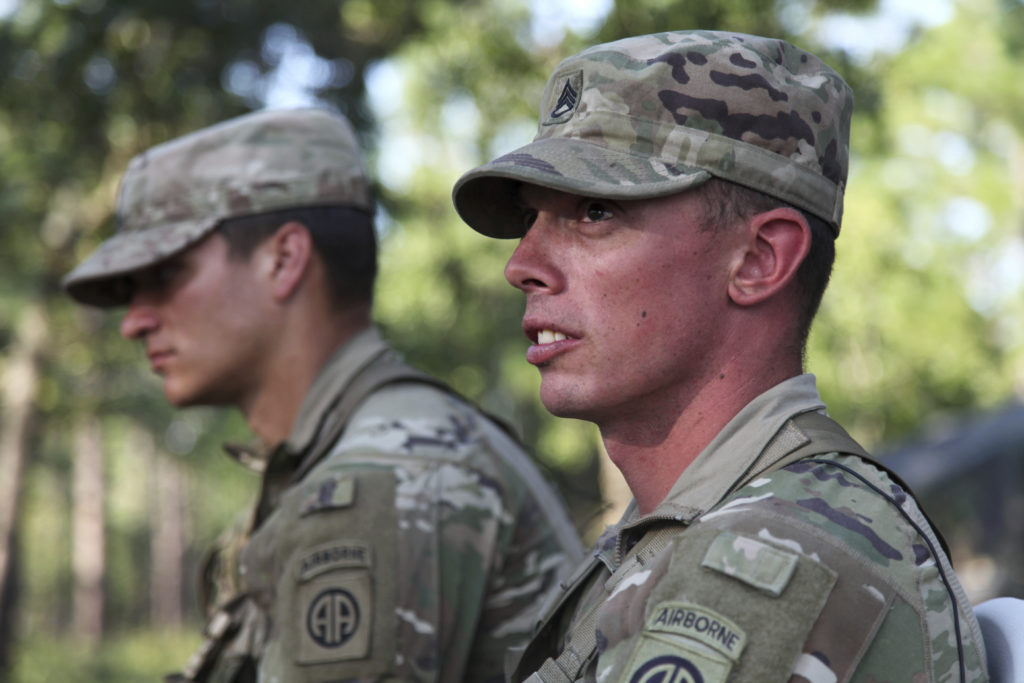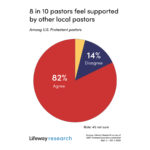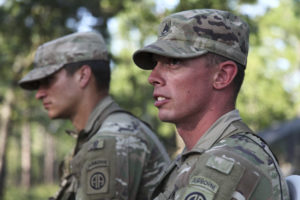
FORT BRAGG, N.C. (AP) – If there were any signs that Staff Sgt. Jason Lowe was struggling, the soldiers he served alongside didn’t see them.
The 27-year-old paratrooper was a top performer. He was on the Commandant’s List and had just finished second in his class in the Army’s Advanced Leader Course, setting him up for a promotion within the storied 82nd Airborne Division at Fort Bragg.
Yet, five days after graduation, after Lowe left texts and calls unreturned, Staff Sgt. Ryan Graves drove to Lowe’s apartment in Fayetteville, N.C., with a bad feeling.
“On the way there I think it set in that maybe there’s something a lot worse going on,” Graves said.
Graves opened Lowe’s unlocked apartment door to discover his friend had taken his own life. Weeks later, the why remains unanswered.
“Everything they teach you, that you’re supposed to look for, doesn’t exist in this situation,” Graves told The Associated Press. “No financial trouble, no relationship trouble.”
Lowe’s was the 10th suicide the 82nd Airborne Division has endured so far this year, a number that stood at four last year. In 2018, six division paratroopers took their own lives; four did so in 2017.
While the driving factors of the suicides remain unknown, Maj. Gen. Christopher Donahue, who assumed command of the division in July, believes that the forced periods of isolation and other stressors the coronavirus pandemic have imposed on his troops and their families have been a major factor. The increase has pushed Donahue to make suicide prevention a priority and frequent topic of conversation within his ranks.
“There is absolutely a stigma that’s out there,” Donahue said. “And if we don’t acknowledge that, we’re lying.”
North American Mission Board Chaplaincy executive director Doug Carver agreed that a stigma exists, noting a need for a more holistic approach to dealing with mental health trauma and suicide ideation among service members.
“We have not broken that stigma that it is OK for you to go to a behavioral health specialist just to talk about some things that are challenging you,” Carver said. “What can we do to ensure that we look out for one another?”
2020 has been an unprecedented year for the 82nd Airborne Division. In January, for the first time in three decades, the Division’s Immediate Response Force was activated amid rising tensions with Iran. Within hours, thousands of paratroopers went from ringing in the new year with family to boarding military transport planes bound for the Middle East.
At the same time, Lowe’s unit was finishing up a nine-month rotation in Afghanistan, America’s longest-running war.
By the time soldiers in both brigades returned to Fort Bragg in the spring, the COVID-19 pandemic was well underway as it threatened to overwhelm the U.S. public health system. Patriotic welcome home ceremonies were replaced with a mandatory two-week quarantine and restrictions preventing paratroopers from going on leave to visit family out of state. Gyms and dining facilities on post closed down and unit meetings were held via Zoom.
While those measures were necessary, Donahue believes it’s the primary fuel igniting the suicide increase.
“COVID has made us a division of strangers and we’re doing everything in our power to bring us back together,” he said.
Carver said isolation is one of the primary reasons soldier struggle with suicide ideation and attempts.
“They may have 300 friends on Facebook, but who do they call at 2 o’clock in the morning?” Carver said. “We’ve increased the isolation of our troops, some of whom are struggling for hope and struggling with personal issues. COVID has required them to social distance and so that obviously leads to a loss of community and talking to some of their friends. COVID, which has its own isolation impact, is part of the problem.”
While suicide has long been a problem in the U.S. military, numbers have risen this year by as much as 20 percent as service members struggle with isolation and other impacts of COVID-19, added to the pressures of deploying to war zones and responding to national disasters and civil unrest. Incidents of violent behavior also have spiked.
The numbers vary by service. Suicide is particularly taking its toll in the Army, where senior leaders told The Associated Press they’ve seen a 30 percent jump in active-duty suicides so far this year compared to last year. They’re looking at ways to shorten combat deployments and put more focus on soldier well-being and less on combat readiness and weapons modernization in response to the rising numbers.
Uncertainty is a given for soldiers assigned to the 82nd Airborne Division. In June, the Immediate Response Force was called upon again, as paratroopers were sent to Washington, D.C., to quell protests after the death of George Floyd in police custody.
Some had just returned home from their first sudden deployment of 2020 and had been out of quarantine for less than a week when they climbed onto buses bound for D.C.
Living life on standby puts an obvious strain on relationships, which is another common thread the division is seeing in its suicides.
Peer support groups have been implemented for soldiers struggling with relationship issues and a sober living initiative has been launched to house paratroopers struggling with substance abuse in a separate, alcohol and drug-free barracks.
But those who knew Lowe can’t pinpoint any of those factors in his sudden and tragic death. Graves tosses around the idea of the pressure Lowe put on himself. But even that is speculation.
“He wanted to be the best. He probably was one of the best,” Graves said.
Instead of delivering the news of Lowe’s passing to his battalion in a mass formation, the notification came over Zoom. Battalion Commander Lt. Col. Christopher Walsh and Command Sgt. Maj. Anthony Gregerson had practice after another soldier took his life earlier this year. The loss weighs heavily on them.
“You consider every decision you make and the impact it has on 630 heart beats,” Walsh said.
Days after Lowe’s death, his artillery battery went into the field for a three-week training exercise. Brigade chaplains visited their remote camp site to offer counseling or simply an ear to listen.
Their services are often rejected by hardened soldiers refusing to ask for help. Couple that with the stigma surrounding mental health and the longstanding belief running deep through the military that seeking counseling could negatively affect a soldier’s career.
But since Lowe’s death, the men and women of the 1-319th Field Artillery Regiment are opening up and chaplains have seen an increase in soldiers wanting to talk.
Carver said the church should play a role in getting service members the help they need.
“The church is a key instrument in the health of our communities,” Carver said. “Churches, especially those that are close to military bases, or those that have large contingencies of military, should have some intentional ministry as far as welcoming new people, or offering community outreach things for new parents or mothers who are staying at home. …
“This is a problem in our society. But the church can play a significant role, we are subject matter experts in the abundance of just living. We really look out for one another, and sometimes we need to ask those very important questions when we see people struggling.”
From The Associated Press. May not be republished. AP reporter Lolita Baldor in Washington and Baptist Press staff writer Tess Schoonhoven contributed to this report.




















